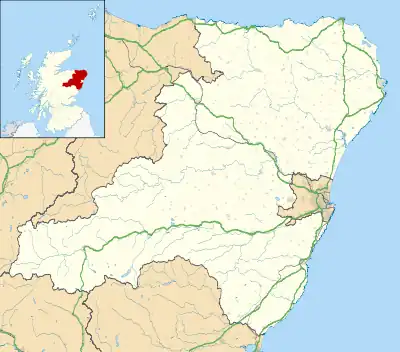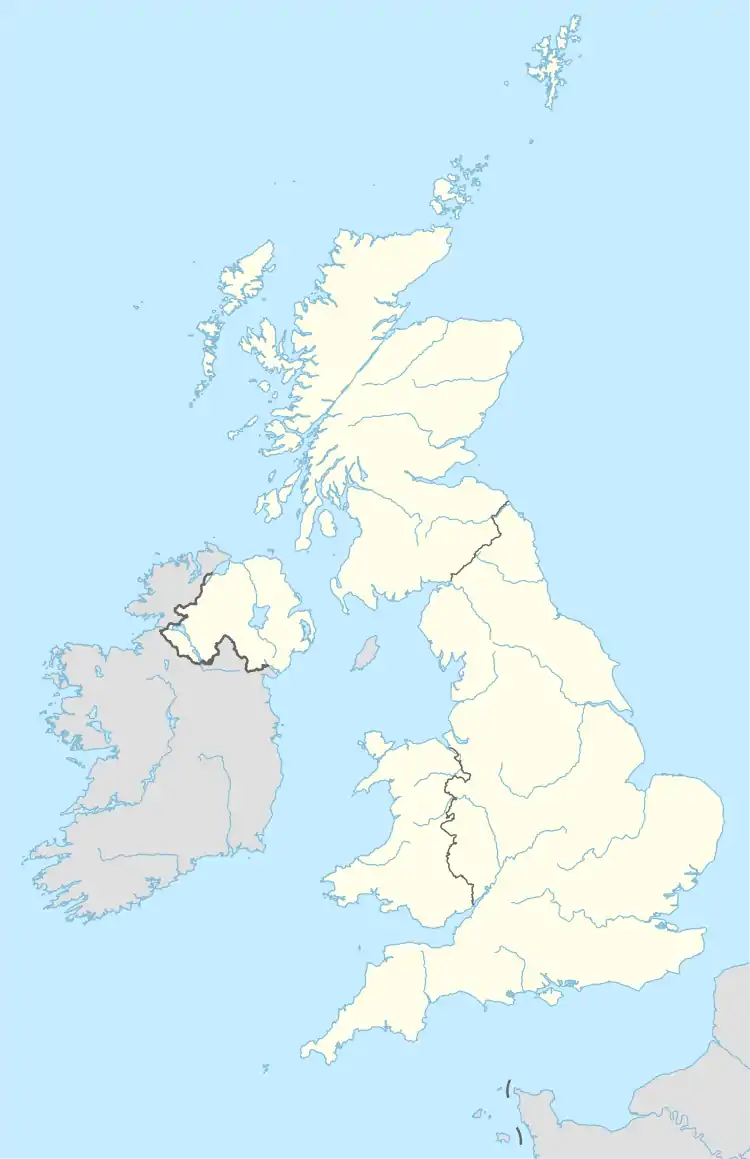RAF Peterhead
Royal Air Force Peterhead or more simply RAF Peterhead is a former Royal Air Force sector station located 2.4 miles (3.9 km) east of Longside, Aberdeenshire and 3.4 miles (5.5 km) west of Peterhead, Aberdeenshire, Scotland.
| RAF Peterhead | |||||||||||
|---|---|---|---|---|---|---|---|---|---|---|---|
| Longside, Aberdeenshire in Scotland | |||||||||||
 RAF Peterhead Shown within Aberdeenshire  RAF Peterhead RAF Peterhead (the United Kingdom) | |||||||||||
| Coordinates | 57.517°N 1.875°W | ||||||||||
| Type | Sector Station | ||||||||||
| Code | PH[1] | ||||||||||
| Site information | |||||||||||
| Owner | Air Ministry | ||||||||||
| Operator | Royal Air Force | ||||||||||
| Controlled by | RAF Fighter Command | ||||||||||
| Site history | |||||||||||
| Built | 1941 | ||||||||||
| In use | July 1941 – August 1945 | ||||||||||
| Battles/wars | European theatre of World War II | ||||||||||
| Airfield information | |||||||||||
| Elevation | 46 metres (151 ft)[1] AMSL | ||||||||||
| |||||||||||
History
The airfield was built in 1941 and disbanded in 1945. During this period there were up to 2,000 RAF personnel based there, including around 250 WAAFs. A large number of RAF squadrons from a variety of nations used RAF Peterhead's five accommodation camps.[2]
In November 1941 the station was hit by two bombs from a Junkers Ju 88 bomber, killing one person and injuring three others. Hawker Hurricane, Supermarine Spitfire and North American Mustang aircraft flew from Longside airfield to provide protection for eastern convoys.[2]
During the 1990s, the airfield site was inspected and aerial photographs were taken as part of an assessment for a proposed pipeline running between St Fergus and Peterhead Power Station. These reports and photographs showed that pillboxes and many buildings still survived, although most of the land had by then returned to agricultural use. The control tower had been demolished.[3] In November 2004, further investigation was undertaken. The report compared photographs from 1946, which showed the airfield and all its ancillary buildings, with photographs taken in June 1969. By then the hangars had been removed but many other buildings and pillboxes still survived.[3]
Squadrons
- No. 19 Squadron RAF[4]
- No. 26 Squadron RAF[5]
- No. 63 Squadron RAF[6]
- No. 65 Squadron RAF[6]
- No. 68 Squadron RAF[7]
- No. 118 Squadron RAF[8]
- No. 122 Squadron RAF[9]
- No. 125 Squadron RAF[9]
- No. 129 Squadron RAF[10]
- No. 132 Squadron RAF[10]
- No. 164 Squadron RAF[11]
- No. 165 Squadron RAF[11]
- No. 167 Squadron RAF[11]
- No. 234 Squadron RAF[12]
- No. 245 Squadron RAF[13]
- No. 278 Squadron RAF[14]
- No. 282 Squadron RAF[15]
- No. 309 Polish Fighter-Reconnaissance Squadron[16]
- No. 312 (Czechoslovak) Squadron RAF[17]
- No. 313 Squadron RAF[17]
- No. 315 Polish Fighter Squadron[17]
- No. 350 Squadron RAF[18]
- No. 402 Squadron RCAF[19]
- No. 409 Squadron RCAF[20]
- No. 411 Squadron RCAF[20]
- No. 414 Army Co-operation Squadron RCAF[20]
- No. 416 Squadron RCAF[20]
- No. 430 Squadron RCAF[21]
- No. 453 Squadron RAAF[22]
- No. 504 Squadron RAF[23]
- No. 598 Squadron RAF[24]
- No. 602 Squadron RAF[24]
- No. 603 Squadron RAF[24]
- No. 611 Squadron RAF[25]
Other units
- Satellite of No. 2 Flying Instructors School RAF (1943)[26]
- No. 14 Fighter Command Servicing Unit[27]
- No. 1479 (Anti-Aircraft Co-operation) Flight RAF (May 1942 - December 1943)[28]
- No. 1491 (Fighter) Gunnery Flight RAF (October 1943)[29]
- No. 2792 Squadron RAF Regiment[27]
- No. 2803 Squadron RAF Regiment[27]
- No. 2848 Squadron RAF Regiment[27]
Current use
The north-eastern section of the airfield has been taken over by Bond Helicopters and Bristows as a refuelling point for helicopters servicing North Sea oil platforms, roughly a 45-minute flight.[2][30]
In 2003, after funds were successfully raised by the local branch of the Longside British Legion, a cairn monument was erected in memory of those who had served at RAF Peterhead, Longside airfield. At the time of the unveiling ceremony of the monument on 14 September 2003, there was a flypast from a Douglas Dakota of the Battle of Britain Memorial Flight.[31]
More recently a stretch of the runway is used for flying radio controlled model aircraft.[2]
References
Citations
- Falconer 2012, p. 160.
- "RAF Peterhead". Secret Scotland. Retrieved 4 February 2013.
- "Peterhead Airfield". Royal Commission on the Ancient and Historical Monuments of Scotland (RCAHMS). Retrieved 4 February 2013.
- Jefford 2001, p. 30.
- Jefford 2001, p. 33.
- Jefford 2001, p. 45.
- Jefford 2001, p. 46.
- Jefford 2001, p. 57.
- Jefford 2001, p. 58.
- Jefford 2001, p. 59.
- Jefford 2001, p. 64.
- Jefford 2001, p. 75.
- Jefford 2001, p. 77.
- Jefford 2001, p. 82.
- Jefford 2001, p. 83.
- Jefford 2001, p. 85.
- Jefford 2001, p. 86.
- Jefford 2001, p. 88.
- Jefford 2001, p. 89.
- Jefford 2001, p. 90.
- Jefford 2001, p. 91.
- Jefford 2001, p. 93.
- Jefford 2001, p. 95.
- Jefford 2001, p. 98.
- Jefford 2001, p. 100.
- Sturtivant, Hamlin & Halley 1997, p. 150.
- "Peterhead (Landplane)". Airfields of Britain Conservation Trust. Retrieved 4 February 2013.
- Sturtivant, Hamlin & Halley 1997, p. 134.
- Sturtivant, Hamlin & Halley 1997, p. 136.
- "Energy archive" (PDF). Aberdeen University. Retrieved 4 February 2013.
- Wilson, Terry. "Longside Cairn". The Royal Air Force Boy Entrants Association. Archived from the original on 27 August 2011. Retrieved 4 February 2013.
Bibliography
- Falconer, J (2012). RAF Airfields of World War 2. UK: Ian Allan Publishing. ISBN 978-1-85780-349-5.
- Jefford, C.G. RAF Squadrons, a Comprehensive Record of the Movement and Equipment of all RAF Squadrons and their Antecedents since 1912. Shrewsbury, Shropshire, UK: Airlife Publishing, 2001. ISBN 1-84037-141-2.
- Lake, A (1999). Flying units of the RAF. Shrewsbury: Airlife. ISBN 1-84037-086-6.
- Sturtivant, R; Hamlin, J; Halley, J (1997). Royal Air Force flying training and support units. UK: Air-Britain (Historians). ISBN 0-85130-252-1.